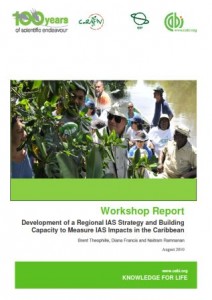 Invasive Alien Species (IAS) are a major threat to the vulnerable marine, freshwater and terrestrial biodiversity of Caribbean islands and to the people depending on this biodiversity for their livelihoods. Caribbean states have recognized the need for a regional strategy and expressed strong interest in linking their national efforts in implementing Article 8 (h) of the Convention on Bio-Diversity (CBD) to mitigate the threats of IAS in the Caribbean; they are also contracting parties to several other international instruments addressing IAS threats.
Invasive Alien Species (IAS) are a major threat to the vulnerable marine, freshwater and terrestrial biodiversity of Caribbean islands and to the people depending on this biodiversity for their livelihoods. Caribbean states have recognized the need for a regional strategy and expressed strong interest in linking their national efforts in implementing Article 8 (h) of the Convention on Bio-Diversity (CBD) to mitigate the threats of IAS in the Caribbean; they are also contracting parties to several other international instruments addressing IAS threats.
CAB International (CABI), in cooperation with strategic partners, is implementing a project titled
“Mitigating the Threat of Invasive Alien Species in the Insular Caribbean (MITIASIC)”. The project aims
to broaden the approach to dealing with IAS by:
Strengthening existing national measures; and
Fostering regional cooperation frameworks through which Caribbean-wide strategies can be developed.
The impact assessment training workshop is part of the overall project goal to build capacity for mitigating the IAS threat. Hosting the regional consultation on an IAS strategy and impact assessment training will contribute to achieving the overall project objective.
The Workshop sought to achieve two objectives, i.e., to
i. get consensus on the need for and content of a regional IAS strategy that will guide national
coordinating organizations towards preparing their own national strategies for managing invasive
alien species.
ii. expose and build capacity among IAS scientists and practitioners to the issues and approaches relevant to economic valuation and cost and benefit impact assessment as the base for justifying preventative and mitigation actions. This report provides a summary review of the Consultation on the Draft Regional Strategy for Managing IAS and the Capacity Building Workshop on Impact Assessment of IAS, highlighting the expected objectives, main issues arising from the dialogue and the expectations for follow-up from this initial meeting.
Read full document here: Report First IAS Consultation